Future Ready: How Economic Empowerment Can Improve Social Mobility for Youth
On 24 October 2024, the Australia Latam Emerging Leaders Dialogue (ALELD), in collaboration with Universidad del Rosario, and sponsored by the Australian Embassy in Colombia, hosted Future-Ready: How Economic Empowerment Can Deliver Social Mobility for Youth as an official side-event to the Latin America and the Caribbean (LAC) Third OECD Ministerial Summit on Social Inclusion.
Held at Universidad del Rosario in Bogotá, the event brought together young leaders and high-level representatives to discuss strategies for enhancing economic empowerment to drive social mobility across the LAC region.
The event began with a panel discussion moderated by ALELD CEO, Sam Bissett, and featured insights from:
- Dominic de Moura McCarthy, Director of Partnerships, ALELD
- Prof. Darwin Cortés Cortés, Department of Economics, Universidad del Rosario
- Daniela Sena, Policy Advisor, OECD LAC Division Global Relations and Cooperation Directorate
During the panel discussion, speakers addressed a range of topics including but not limited to:
- How governments and international organisations can collaborate to enhance social mobility opportunities for youth in the LAC region.
- The role public-private partnerships can play in improving social protection systems for youth people.
- Barriers preventing youth from accessing education and employment, and how can these be addressed.
Following the panel, a roundtable encouraged participants to delve deeper into these themes and discuss actionable policy solutions, focusing on two key areas:
1. Skills Development and Access to Employment
Participants explored challenges in Colombia’s job market, such as limited access to education and low wages, especially in rural areas.
Key Insights:
- Many young Colombians face low wages despite having undergraduate degrees, partly due to a lack of technical skills and limited job opportunities.
- Vocational training and technical careers, which align more closely with job market demands, are undervalued in the LAC region.
- Better alignment is needed between basic and higher education, as well as extending educational resources to rural areas.
Areas to Address:
- Strengthen the connection between basic and higher education to streamline student transitions to employment.
- Extend educational programs and resources beyond capital cities and to remote areas.
- Promote the development of technical and vocational skills valued in the job market.
- Involve young people in policy-making around education and employment to understand their needs and aspirations.
2. Social Innovation and Entrepreneurship
The group discussed the lack of opportunities for Latin American youth, especially in entrepreneurship and small business.
Key Insights:
- Violence and economic inequality in Latin America create significant barriers that hinder entrepreneurial opportunities for youth by preventing alignment between government, market, and educational expectations.
- The slow pace of digitisation contributes to a poor business operational environment, limiting opportunities for entrepreneurs and hindering economic growth.
- Building a supportive business and digital environment for youth-led businesses is crucial for fostering entrepreneurship and improving the region's small business climate.
Areas to Address:
- Improve coordination between government, businesses, and educational institutions to promote youth entrepreneurship.
- Implement practical, skills-focused education programs starting in secondary school.
- Simplify the processes for business establishment to reduce bureaucratic barriers.
- Develop public policies that support digital skills and entrepreneurship.
Policy Recommendations for Latin American and Caribbean Governments
As a result of these discussions, seven policy recommendations have been identified to improve economic and social mobility for young people in the LAC region.
1. Strengthen Educational Pathways: Improve the link between basic and higher education and extend educational and vocational training programs to rural areas.
2. Promote Technical and Vocational Careers: Encourage educational institutions to focus on practical skills development and promote careers aligned with job market needs.
3. Support Youth Entrepreneurship: Simplify processes for business creation and implement supportive public policies for young entrepreneurs.
4. Enhance Digital and Business Skills: Expand digital skills training and practical business education, beginning at the high school level.
5. Inclusive Policy Development: Create an inclusive environment where youth voices are prioritised, particularly in policy discussions related to employment, education, and job creation.
6. Encourage Regional Cooperation: Foster collaboration between governments, businesses, international organisations and educational institutions to align efforts on youth empowerment and social mobility.
7. Support Early Education and Care: Focus on improving early and high school education to equalise opportunities from a young age.
Content Disclaimer
The views expressed in this article are those of the author and do not necessarily represent the views or opinions of the Australia Latam Emerging Leaders Dialogue.



